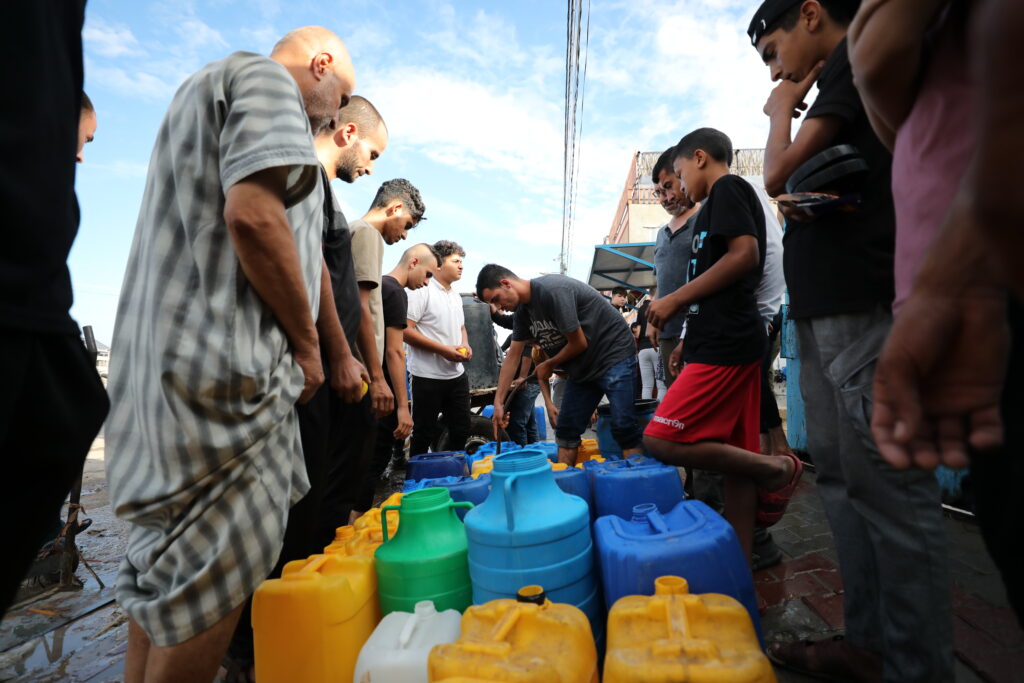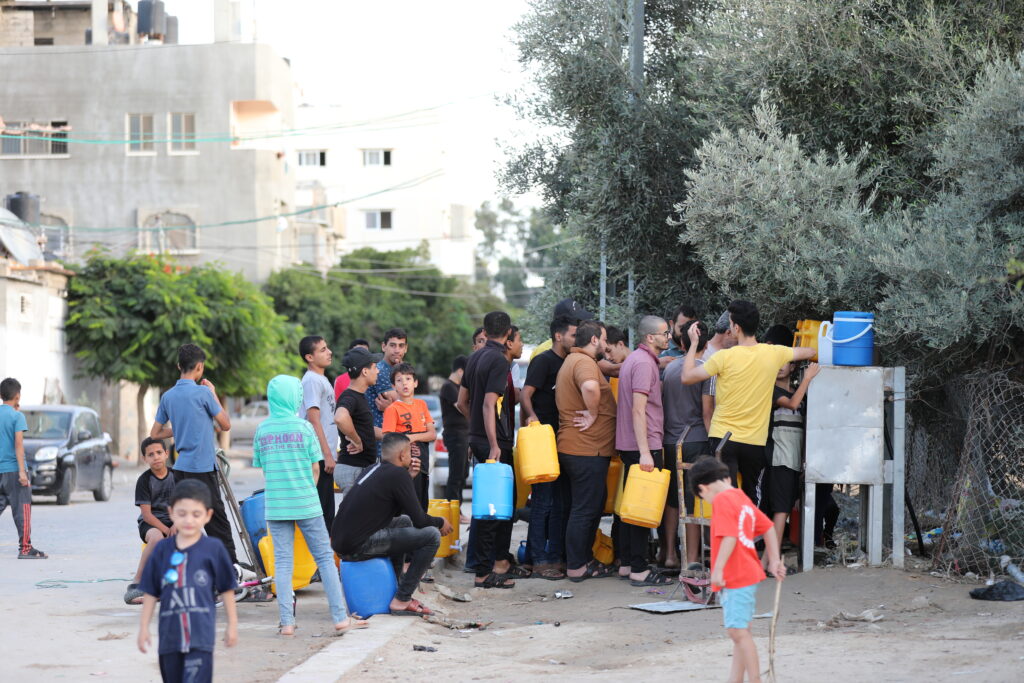Amid a devastating escalation in the region, families in Gaza are struggling to find safe water to drink. It’s a problem many have experienced before but, as the escalation stretches on, the lack of water is becoming more acute – and increasingly, a matter of survival. Here, we explain the causes and effects of Gaza’s ongoing water crisis.
What’s happening in Gaza?
Gaza is under bombardment amid a serious escalation in the region that has so far left thousands of people dead, and tens of thousands more injured across the Occupied Palestinian Territory and Israel.
In the last week, more than 1 million people have been ordered to evacuate northern Gaza and move to the south of the Gaza Strip.
Israel has cut electricity, fuel and water supplies to Gaza as part of a ‘total blockade’ of the territory and has so far not allowed aid into the coastal enclave. In recent hours an agreement has been announced to allow a small amount of humanitarian aid in through the Egyptian border, but this is nowhere near enough to meet the huge needs.
Does Gaza rely on Israel for water?
Israel controls most water resources and related infrastructure in the Occupied Palestinian Territory.
Most of Gaza’s water comes from a small part of the Coastal Aquifer – a body of rock that holds groundwater. However it is contaminated with saltwater and untreated sewage and is not enough to meet the huge needs of the growing population.
The remaining water supply comes from a desalination plant and wells, and some that is purchased from Israel.
Israel also controls what materials can enter Gaza for maintaining and repairing Gaza’s water infrastructure, which is old and has been repeatedly damaged by bombing.
How is the ‘total blockade’ affecting the water supply?
Without fuel or electricity, it is impossible to supply Gaza’s homes, hospitals, farms and schools with water. Gaza’s desalination plant has shut down this week due to lack of fuel.
Gaza does not have a water grid that all buildings are connected to, rather buildings have water tanks which are filled regularly. Without electricity or fuel, water cannot be transported to these tanks, nor can it travel from the tanks into taps, showers and hoses for use.
Large water tankers previously distributed water to homes and other buildings, but bombing has made it too dangerous for drivers to travel to even fill up their tankers, let alone service their normal routes. Even without the bombing, the lack of fuel would present a huge challenge for deliveries.

Many buildings in Gaza also have wells, but without an electricity supply it is almost impossible to pump the water from these wells into the buildings’ storage tanks. While generators have long been used to cover patches in Gaza’s electricity supply, now people are struggling to find fuel to run the generators.
Even when people are able to draw water from a well, the water is usually not safe to drink.
The United Nations has described the lack of water as a “matter of life and death” for the more than 2 million people living in Gaza.
It estimated that the average person in Gaza is currently consuming 3 litres of water per day. The World Health Organization recommends individuals have access to a minimum of 50-100 litres per day.
On top of the blockade, bombing has destroyed pipelines and other key water treatment infrastructure.
How are people coping with the situation?
Securing enough water for 1 family has become a time consuming and labour-intensive daily task. Islamic Relief staff in Gaza have described the ongoing frustration of getting access to a well, only to have to find a generator, only to then have to search for fuel to power it, only to have to come up with a solution to carry heavy loads of water back home without fuel for trucks and cars.
Families are doing what they can to reduce their water usage to the bare minimum. Women carefully consider which meals to prepare based on how much water it will take to make them and how many dishes will need to be washed afterwards. While others have had to schedule set times to flush the toilet each day to conserve water.
Simple, everyday tasks that are normally performed without much thought, now require constant consideration and adaptation.
What was the situation like before the current escalation?
The humanitarian situation in Gaza was dire even before this month’s escalation and access to clean water was limited.
In June, UNICEF reported that 96% of water in Gaza was not safe for human consumption. On top of the poor quality of the water, there were also severe issues with maintaining a reliable supply of water to households and facilities due to a lack of fuel and electricity.
This situation led many people to buy expensive bottled water, putting further strain on already stretched incomes, or to risk drinking water that they know is unsafe.
What are the risks of drinking unsafe water?
Water is essential for human life and most people cannot survive more than a few days without it. When a person becomes dehydrated, essential bodily functions get disrupted. This can lead to death in extreme cases.
Drinking unsafe water exposes people to waterborne diseases, many of which can be life-threatening and require medical treatment that facilities in Gaza will struggle to provide amid the current crisis.

Much of the water in Gaza is contaminated with salt and other minerals. Drinking this type of water can lead to severe kidney problems and eventually death by dehydration.
Kidney issues are already a serious issue in Gaza, which experiences a 13-14% annual increase in the number of patients suffering from kidney problems, according to Oxfam.
How else is the lack of water affecting Gaza?
Water is essential in maintaining hygiene and sanitation. Without a reliable supply, homes and hospitals in Gaza are struggling to maintain safe conditions.
Meanwhile, homes have been destroyed by bombing and more than 1 million people have been ordered to evacuate northern Gaza. This situation has resulted in overcrowding in temporary shelters, and a sharp population rise in southern Gaza.
Large numbers of people living in close proximity present a risk of disease outbreak, which is much more severe when hygiene cannot be maintained.
Gaza’s sewage processing plants have ceased to function, meaning sewage is accumulating in the streets or being dumped into the sea.
Without water, farmers cannot irrigate their crops or care for their animals, meaning the food supply could be affected.
While for Gaza’s Muslim-majority population, water also holds a spiritual significance and is needed to perform ritual cleansing before prayer.
Can’t we repurpose water from the sea? What about rainwater?
Gaza’s desert climate means rainwater is not a reliable source of water throughout the year. Like many parts of the world, Gaza is experiencing the effects of climate change and seeing hotter, drier periods.
Despite the climatic conditions, it is important to note that the water crisis in Gaza is largely man made and a direct result of occupation. Israel, Gaza, the West Bank and Jerusalem share roughly the same climate, but there is a stark difference in Palestinians’ ability to access water as well as the quality of that water.
The average Israeli citizen consumes around 240 litres of water per day, three times that of a Palestinian in the West Bank (82 litres) and 80 times what people in Gaza currently have access to.
Desalination is a process several countries use to remove salt from seawater, making it safe to use for drinking and farming. It is particularly heavily employed in the Middle East and Gaza does have a desalination plant. However, without stable electricity and fuel supplies, the desalination plant cannot function properly and provide safe water.
On top of this, Gaza’s access to the sea is tightly restricted and has become more so since the escalation began.
How is water linked to human rights?
The United Nations recognises access to water and sanitation as a human right “fundamental to everyone’s health, dignity and prosperity.”
The organisation says everyone has the right to a water and sanitation service that is “physically accessible within, or in the immediate vicinity of the household, education institution, workplace or health institution.”
Islamic Relief has been a lifeline to vulnerable people in Gaza for decades. We have distributed drinking water amid conflicts, repaired damaged water supplies, and provided clean drinking water to over 1 million people in schools and health facilities. However, the total blockade has seen water supplies dwindle to dangerous levels.
With the humanitarian crisis spiralling out of control, Islamic Relief continues to call on world leaders for action to ensure an end to the siege. Aid – including clean, safe water – must be allowed to reach all civilians in need.
Please help Islamic Relief to support people in desperate need in Gaza. Donate to our Palestine Emergency Appeal now.










